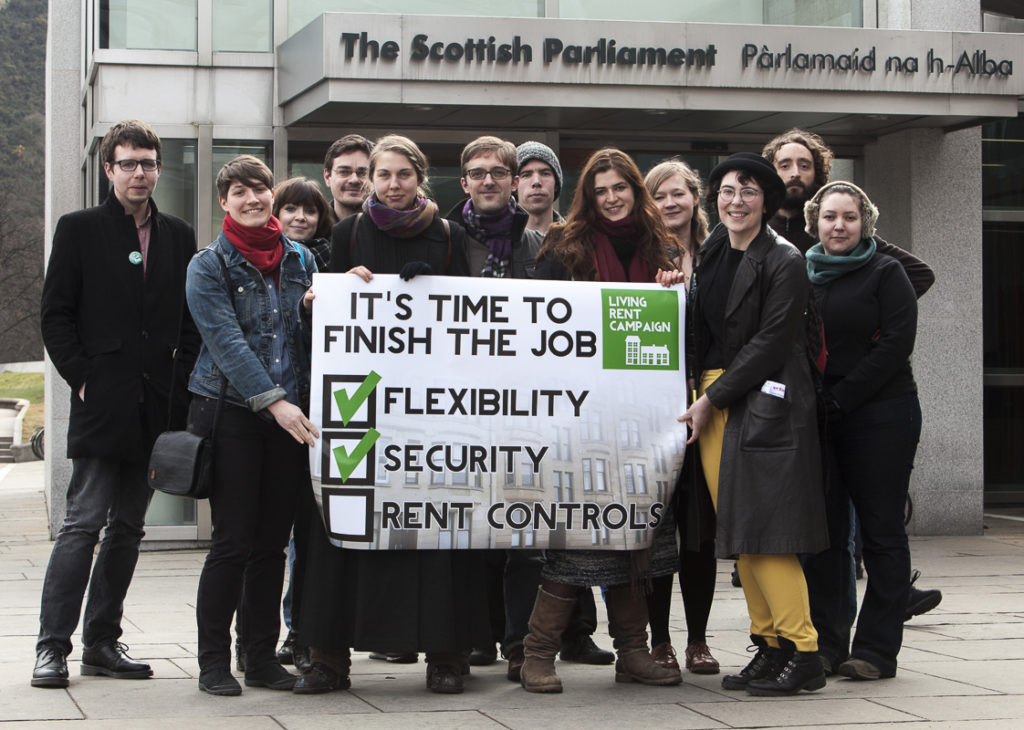An Invisible Hand no more: challenging corporate dominance in Scotland means work, not despair
 I’m a real fan of Summer. I’m sure I’m not the only one who is either, given how many folks are out and about everywhere you look in Edinburgh. Making the most of the heatwave while it lasts! The Summer is still young – after all, it’s only July!
I’m a real fan of Summer. I’m sure I’m not the only one who is either, given how many folks are out and about everywhere you look in Edinburgh. Making the most of the heatwave while it lasts! The Summer is still young – after all, it’s only July!
Yet, there’s another immediate context today in which “after all, it’s only July” strikes a much less joyful note. If anything, it’s quite the opposite. For given certain headlines today, you can reflect on the ongoing outpouring of bad economic news. How much has already happened so far this year, and after all, it’s only July. From major retail headlines alone already 22’000 people across the UK have already been hit by job losses in the last 6 months. Factor in smaller businesses, the impact of budget cuts to the public sector and more that figure is substantially higher – masked in part by the ongoing rise of underemployment: zero-hours contracts, bogus self-employment and deep-rooted casualisation. The really galling part, is that it is transparently clear these almost all of these job losses were totally avoidable. Behind all these job losses, behind the growing list of store closures, behind the UK’s stagnant economic performance (Office for National Statistics’ figures show barely 0.1% growth for the first three months of the year) stands one core problem. Our domestic market is being strangled by low pay and choked by profiteering utility prices.
The Consumer Price Index, the average cost of a standard basket of groceries, rose by 2.7% in 2017 – evidence proves the rate of increase is still mounting. Between 2016 and 2017, the average total cost of household energy bills rose by 13%, with predictions of another, higher rise for this year increasingly widespread. The average rent on a two-bedroom property rose 19.9% across Scotland between 2016 and 2017, a trend that only appears to be gathering pace. Meanwhile, the minimum wage for those over 25 has been increased by barely 33p per hour since 2017.
When wages are stagnant, and the cost of living rising, the outcome is sadly predictable. Millions of folk have less and less after the essentials, and the domestic market shrinks. The domestic market shrinks, sales fall. Sales fall, profits fall, and the big bosses and corporations boost their profits instead by further holding down wages. When the economy is not growing, the only way to give to the rich is to take ever more from the rest of us. The size of the economy remains much the same, but with the division of wealth sucked upwards, into ever more and more concentrated holdings.
For wealth absolutely continues to suck upwards. ONS figures also show that between 2014 and 2016, the wealth of the least-well-off 10% of households fell by between £3’000 and £32’000 per household, whilst the number of Millionaires in the UK rose by 29%. This was a period where the size of the UK economy barely grew – the only change has been an upwards redistribution of wealth. Richard Branson now holds more than $5.1 billion. Mike Ashley holds more than $3.8bn. Yet neither of them considers this enough, each seeking to add to their mounting hoards by paying staff barely enough to get by. Sometimes less. That sucking upwards of wealth is only gathering pace. Working people are being trampled over to make way for the interests of the biggest corporations and the super rich.
The problem is not just the corporations themselves – across the world, we are plagued by politicians kept utterly in the pocket of the corporate lobby. Just look at the deals taking place in England, where Westminster Tory politicians connive to flog off chunks of the English NHS. Just look at the Irish Government, exposed helping Apple skip over €22billion in corporation tax across the EU. Just look at Trump with tax cut after tax cut for the super rich.
Little wonder so more folks are starting to look around for an alternative – and it’s starting to show. Let’s even just look at Edinburgh for a moment. It’s why the response to the real Living Wage have been steadily growing, with growing numbers of folks joining an ever more vibrant campaign. It’s why the message of campaigns like Fair Fringe have begun to tacitly win concessions from the City Council and many Festival employers. It’s why groups like Living Rent have been gathering numbers with a growing sense of momentum, both in the papers and on the pavements. Moreover – we all know that this is not just an Edinburgh phenomenon – the same is true right across our country. Even in the USA, groups like the Democratic Socialists of America have notched up noticeable membership gains – these are folks visibly trying to plant the seeds of change.
 Let’s not get carried away though. For all these parties and campaigns are growing, our political landscape remains totally dominated by the power of the super rich. We are a long way from breaking the stranglehold of the Corporate lobby – but nonetheless we can rightly celebrate that across our countries there are signs that many of the parties, formations and campaigns looking to call attention to that stranglehold, and to ultimately throw it off altogether, are showing positive signs of growth. The challenges ahead are steep, but overcoming them is both possible and necessary.
Let’s not get carried away though. For all these parties and campaigns are growing, our political landscape remains totally dominated by the power of the super rich. We are a long way from breaking the stranglehold of the Corporate lobby – but nonetheless we can rightly celebrate that across our countries there are signs that many of the parties, formations and campaigns looking to call attention to that stranglehold, and to ultimately throw it off altogether, are showing positive signs of growth. The challenges ahead are steep, but overcoming them is both possible and necessary.
That means building up that transformative vision for Independence which puts the people, not the corporations, first. Going into the next referendum with that vision at the very fore gives us an opportunity to not only win independence, but to deliver the greatest possible shift in power back into the hands of the people.
It means keeping campaigning to win the real £10 an hour Living-Wage as a minimum for all. The increases we’ve seen over the last few years have been small, and far short of what we need. But without that constant pressure and work from activists, from trade unionists – from working people the length and breadth of our country, there would likely have been no increase at all.
It means raising the question – why shouldn’t we restore overpriced essential utilities like gas, electricity and rail into the public hands from which Thatcher’s dogmatism took them? In doing so we can reduce the huge, needless drain on people’s income. Why should working people be held to ransom just to feather the nests of some of the richest executives in the world?
If Corporations think they can run roughshod over the people, they must be challenged – and together we can challenge them. If we are blighted with politicians who prefer to pander to the corporations rather than standing up for the people, then they must be replaced – and together we can replace them. The source of the sense of helplessness that many folks are struck by are plainly visible, and the feeling is understandable – but there are clear alternatives budding up into the sunshine where those of us looking for change can all come together, work together and slowly but surely start inching towards real change. Ultimately And hey – I’m not complaining that some of the best summer tans I’ve ever gotten have been from time on stalls and on the campaign trail along the way. We’ve got to start somewhere – it may still only be July, but there’s no better time to start than today.

Well said Calum. I have believed for some time, ever more strongly since the 2014 Referendum, that this message is the key to motivating the young and the majority of people left behind and marginalised. The goal of independence has to be a far better and fairer Scotland for all.
The ‘invisible hand’ is thrown out in the title but not referenced in the body so one has to make the connection between the two.
The invisible hand is usually associated with the Scottish moral philosopher, Adam Smith. The invisible hand can be no more because it wasn’t a real thing in the first place. It was and is a figmant of the imagination of neoclassical economists, whether out of ignorance or as propaganda, you can choose. Leftist critics of neoclassical economics do themselves and Smith a disservice by failing to recognise that economists have taken Smith’s ideas and turned them on their head.
Adam Smith used the “invisible hand” only once in the Wealth of Nations. It was a metaphor; not a theory. It was a metaphor in common use at the time. The main target of his book is mercantilism, the economic system of the time. The book sets out to expose mercantile economic theory as nonsense that hides collusion between government and commercial interests against the public interest (seem familiar?). The use of the “invisible hand” appears in Book IV of Wealth where it is used in a passage attacking government intervention on behalf of mercantile elites to further their own interests against those of the public. For Smith the public interest depended on government by persons of moral character who act in the public interest. He wasn’t against government and regulations, in fact he was for good regulations that restrained the banks, merchants and the large corporations of his time in ways that prevented them from threatening social stability and well-being. However, the problem with the government of his time is that it was usually bought off and persuaded to enact laws that favoured the elites against the broader public interest. He wasn’t very optimistic. Reading his book it’s hard to think he’d be entirely surprised by the current state of modern Britain.
If one plans on creating a “transformative vision for Independence which puts the people, not the corporations, first” Scots would do well to recover and heed that sage advice and cautions on such matters in the political philosophies of Smith and his friend Hume. Be practical and not Utopian.
A big part of the problem is people blindly buying on the Web from large corporations goods made cheaper by exploitation of the poorest using cheaper hydrocarbon fuels with low environmental standards. Some may have little option due to their own poor income but many don’t think and are participating in the transfer of wealth and leading further to the decline of working conditions and available employment here.